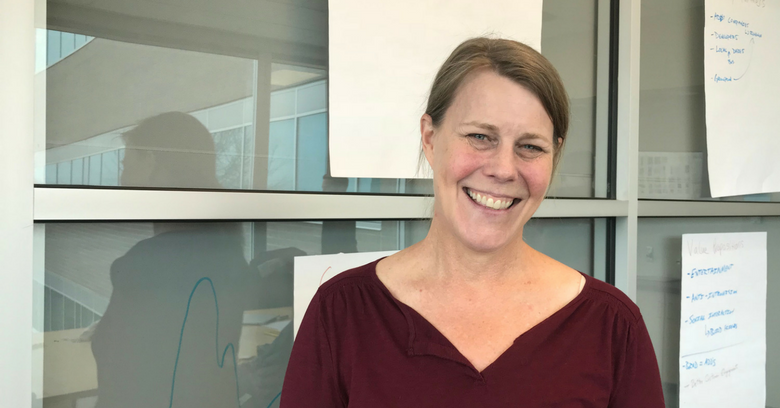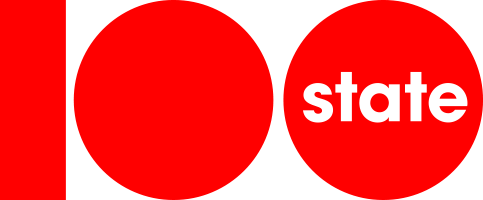100stories: Crap, I’m an entrepreneur again

By Sandra Bradley, as told to Violet Jinqi Wang
I like to call myself an accidental entrepreneur.
I fell into my first entrepreneurial journey because I knew how to do something that was in hot demand — web development. Growing to meet that demand and forming a company just made sense.
It was in the early 90s — the embryonic period of the internet. I had moved to Madison from the San Francisco Bay Area for my doctoral program in Journalism and Mass Communication. I was a huge experimenter and a bit of a geek. In my spare time, I built computers and spent a lot of time online and in first-person shooter games. These experiences taught me that the best way to learn new tech skills quickly is to immerse yourself in the tech, and to connect with online communities.
At that point, the Internet was still just an abstract concept. Then the introduction of the World Wide Web made commercialization opportunities real. It was a transformative time, very much like today with the rapid introduction of disruptive tech.
I started building websites then. So many professionals wanted to learn web development, and few people were qualified to teach. The Division of Continuing Studies at UW-Madison asked me to teach basic HTML bootcamps at the start. This was a time before there were real development tools and we were hand coding in Notepad. Teaching was a great way to continually learn new things.
There was so much demand at that time, it made sense to leave the doctoral program to start a new web development boutique to take advantage of the opportunity. Looking back, entrepreneurship meant something very different for me then, compared to now. I was young and had little to lose, and there was so much demand and so little competition. I ran the boutique with as many a 15 employees and was later acquired by Hiebing, one of the biggest advertising agencies in the Midwest, to establish a new interactive practice area. I learned a lot about startup acquisition by a large entity and the adoption challenges that come with it.
The second round of my startup journey was a bit more intentional. I noticed a lot of companies were struggling with effective innovation and survivability. I had an idea to build a corporate innovation center that sparked innovation through the collaboration of corporations, startups, and universities. But it became clear that finding the right soil to grow the idea was not as easy as I first thought. After piloting some of the ideas on the UW-Madison campus, it became clear that my vision for collaboration and experiential learning while working on real-world problems had to be on neutral territory, which required a new independent company. Hyper Innovation was launched.
While I was thinking about how to execute on the idea, I was inspired by an innovative program at Cisco, Cisco Hyper Innovation Living Labs (CHILL), where they bring customers together with Cisco engineers to quickly solve existing problems. It’s all about “learning by doing,” but there are rules of engagement and processes for managing outcomes — everything from incremental innovation to new products to spinouts. I thought, “What if I take that idea and open-source it?” That was the genesis of what I am calling a Co-Innovation Lab.
Ten months in, we are gaining traction with some great companies, including Alliant Energy, CUNA Mutual Group, and American Family Insurance. Companies use us as an external problem-solving lab, an incubator to accelerate professional development, and a safe place to covertly explore disruptive ideas and partnerships.
I did wake up one morning and think, “Oh crap, I’m an entrepreneur again.” But the passion around the idea had taken hold, and I’m not sure I could have stopped it if I wanted to. There is a clear need to help companies innovate better, faster.
I am somewhat unique being a “later life stage entrepreneur” at 100State. I feel more pressure to validate my ideas quickly, I have greater personal responsibilities (parenting, mortgage, pets), and I have a greater fear of failure. Being a woman, older, and in tech is a trifecta making me stand out in a field where a lot of young men in hoodies reign. I do continue to see, unfortunately, a regular subtle misogyny from people you wouldn’t expect. Often they’re not even aware.
The words “diversity” and “inclusion” often feel like they have no meaning beyond a checkbox on an employment form. I can share any number of stories of people who preach the right mantras but aren’t fully observant of their biases and actions. To effectively advance success for all, I believe individuals and corporations have distinct roles. For individuals, especially women, it isn’t about working harder or doing more or being better. You have to step out of your comfort zone, disrupt the status quo, and continually educate and inform leadership about how to balance the table. Corporate leaders need to proactively promote diverse thinking and inclusive communities in their organizations, instead of just paying lip service to the ideals. This is one area we target directly through executive programming at Hyper Innovation.
Being an accidental entrepreneur doesn’t mean unintentional. As one of my colleagues likes to say, the reality is that being an entrepreneur is hard: You have to work long hours, you’re lonely, and you probably make less money. But, for me, there is important work to do. The market need, your passion, and the idea drive everything. I’ve found my purpose planting the seeds of disruption as an entrepreneur.
Previous Post
100stories: I’m a blockchain skeptic, but I’m all in
Next Post
100stories: People ask me, “So you think you know what’s fair?”
Recent Posts
- Founders Circle Ignite: The Ultimate Entrepreneurial Bootcamp at 100state February 9, 2025
- 100state: Madison’s Entrepreneurs hub to Ignite Dreams February 9, 2025
- Top 5 Benefits of Coworking for Startups in Madison November 28, 2024
- Founder’s Circle Ignite Program: Empowering Madison Entrepreneurs with 100state November 27, 2024
- The Benefits of Coworking for Mental Health and Productivity November 23, 2024
Categories
- 100arts (11)
- 100stories (11)
- AI (1)
- Blockchain (1)
- Community (30)
- coworking (4)
- entrepreneur (9)
- Events (11)
- Freelancers (8)
- Member of the Month (23)
- Membership (23)
- Nonprofit (7)
- Social Marketing (3)
- Startups (16)
- Uncategorized (79)
- Working Remote (8)
